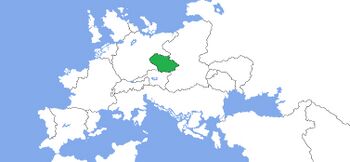Rudhoren: Difference between revisions
No edit summary |
No edit summary |
||
| Line 82: | Line 82: | ||
For most of its history, the area referred to as Rudhoren ("red ore") was divided amongst a collection of Altish and Alytaji kingdoms and states in the west and east, respectively. During the 1836-40 [[War of Altish Unification]], seven of the nine Altish kingdoms joined with the [[Kingdom of Almeria]] and were later incorporated into the [[Altish Empire]]. Likewise, independent Alytaji states in eastern Rudhoren were absorbed by Alytaj. After the [[Great War (Verthandi)|Great War]] and the collapse of the Altish Empire, the [[Treaty of Verdon]] mandated the creation of an independent state in the Rudhoren region. Furthermore, special clauses in the Verdon Treaty forbid the new country from pursuing repatriation with Altenland or Alytaj, as well as establishing military agreements with either country. | For most of its history, the area referred to as Rudhoren ("red ore") was divided amongst a collection of Altish and Alytaji kingdoms and states in the west and east, respectively. During the 1836-40 [[War of Altish Unification]], seven of the nine Altish kingdoms joined with the [[Kingdom of Almeria]] and were later incorporated into the [[Altish Empire]]. Likewise, independent Alytaji states in eastern Rudhoren were absorbed by Alytaj. After the [[Great War (Verthandi)|Great War]] and the collapse of the Altish Empire, the [[Treaty of Verdon]] mandated the creation of an independent state in the Rudhoren region. Furthermore, special clauses in the Verdon Treaty forbid the new country from pursuing repatriation with Altenland or Alytaj, as well as establishing military agreements with either country. | ||
Since its creation, Rudhoren has been plagued by political and economic instability brought upon by ineffective state-building by the victorious powers of the Great War, coupled with a recessive world economy. Botched land reform and ineffective rule by the nation's first president, [[Wilhelm Jung]], had devastating effects on the already-fragile Rudish economy and resulted in Jung being assassinated in June of 1926. WIP. | |||
Revision as of 18:12, 26 December 2023
This article is incomplete because it is pending further input from participants, or it is a work-in-progress by one author. Please comment on this article's talk page to share your input, comments and questions. Note: To contribute to this article, you may need to seek help from the author(s) of this page. |
The Republic of Rudhoren Der Republik Rothoren, Republika Rudhorena | |
|---|---|
|
Flag | |
| Motto: Justice and honor reign. | |
 Sudenland located in central Cybelleum | |
| Capital | Viernheim |
| Official languages | Southern Altish dialect, Czajcz |
| Recognized languages | Alpanian, |
| Demonym(s) | Sudish |
| Government | Federal constitutional republic |
• President | Kornel Janosik |
• Chancellor | Antonin Spahn |
| Legislature | Republican Senate |
| Population | |
• 1935 estimate | 9,855,000 |
| Currency | Rudish Dollar |
| Driving side | right |
Rudhoren (Altish: Rothoren) (Czajcz: Rudhorena), officially the Republic of Rudhoren, is a sovereign country located in central Cybelleum. It is bordered to the north by Altenland, to the east by Alytaj and to the south by Sudenland. It is a multi-ethnic state comprising mainly Altish and Alytaji peoples.
For most of its history, the area referred to as Rudhoren ("red ore") was divided amongst a collection of Altish and Alytaji kingdoms and states in the west and east, respectively. During the 1836-40 War of Altish Unification, seven of the nine Altish kingdoms joined with the Kingdom of Almeria and were later incorporated into the Altish Empire. Likewise, independent Alytaji states in eastern Rudhoren were absorbed by Alytaj. After the Great War and the collapse of the Altish Empire, the Treaty of Verdon mandated the creation of an independent state in the Rudhoren region. Furthermore, special clauses in the Verdon Treaty forbid the new country from pursuing repatriation with Altenland or Alytaj, as well as establishing military agreements with either country.
Since its creation, Rudhoren has been plagued by political and economic instability brought upon by ineffective state-building by the victorious powers of the Great War, coupled with a recessive world economy. Botched land reform and ineffective rule by the nation's first president, Wilhelm Jung, had devastating effects on the already-fragile Rudish economy and resulted in Jung being assassinated in June of 1926. WIP.
